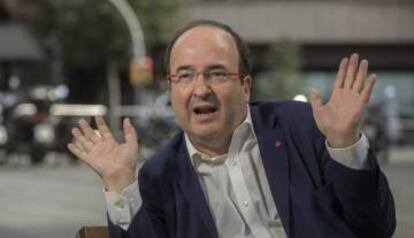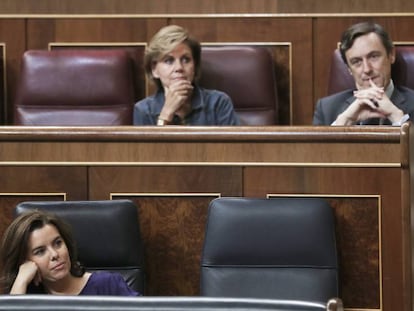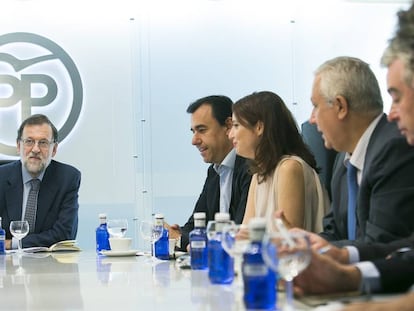Socialist voters torn: allow a PP executive or risk defeat at new election
Poll shows most Spaniards feel last-minute deal to avoid new polls is still possible

With two weeks to go before Spain is pushed into a new general election, Socialist voters are evenly divided between those whose priority is stopping acting Prime Minister Mariano Rajoy from returning to office, and those whose main motivation is to avoid sending Spaniards back to the polls.
A Metroscopia poll for EL PAÍS shows that 49% of Socialist Party (PSOE) voters think it is paramount to stop Rajoy’s Popular Party (PP) from forming a government.
47% of PSOE voters feel a third election must be avoided at all costs, even if it means delivering the executive to Rajoy
In practice, this would mean the PSOE voting against Rajoy at an investiture vote to be held in the coming days. Were this to happen, it would prolong Spain’s 10-month stalemate until October 31, when the political calendar mandates that King Felipe VI must dissolve parliament and call new elections for December.
But 47% of PSOE voters feel that a third election must be avoided at all costs, even if it means watching their party deliver the executive to Rajoy through an abstention at the investiture vote.
However, when asked what is better for the party itself, 56% of PSOE voters answered “avoiding an election.” This is because polls are forecasting that a third election would favor the PP, which stands to gain as much as five percentage points on the June 26 election, while the PSOE would lose support.
Taking all voters into account, 66% said they would rather avoid new elections. This view holds true for supporters of the PP, the PSOE and Ciudadanos but not of Podemos, whose voters clearly (60%) prefer to see new elections.

The Metroscopia survey also shows a significant shift in views regarding the likelihood of politicians reaching a last-minute deal. While a month ago, 68% of respondents were pessimistic about the chances of an accord, that share has gone down to 37%, while 59% now feel that a deal is possible.
This change in attitude is due to developing events within the PSOE, which performed poorly at September’s regional elections in Galicia and the Basque Country, and whose secretary general recently resigned over the issue of abstention at a highly charged party meeting in Madrid.
The interim management team that took over on October 1 has been quietly pushing the abstention option among party officials, but the final decision must be taken by the Federal Committee, which will likely meet on October 23, a day before Felipe VI is scheduled to start a new round of talks with party leaders to test the political waters.
Against, no matter what
The issue of whether to abstain in Congress is proving so divisive for the Socialist Party that the leader of its Catalan branch, Miquel Iceta, is vowing to vote against Rajoy no matter what the leadership decides.
“No matter what the cost to me and to us, the Catalan Socialist Party (PSC) will vote no to Rajoy. We say this because an abstention would be detrimental to Spain and also to the PSOE, because the opposition would effectively be defused,” said a defiant Iceta in an interview with EL PAÍS.
If the PSOE abstains now, it will bring back the ghost that has hurt us so much in the past
Miquel Iceta, PSC leader
That a veteran PSOE official should openly challenge the leadership illustrates the scope of the dilemma for a party that is struggling to define its role as a left-wing following the rise of the protest parties Podemos and Ciudadanos.
“If the PSOE abstains now, it will bring back the ghost that has hurt us so much in the past, the one created by the Indignados movement – that slogan about “PSOE and PP, they’re the same old crap.”
Iceta goes further, noting that if Rajoy is allowed back into office, “what will the PSOE do when it is asked to support the PP out of a sense of responsibility” on issues like the national budget or EU spending cuts?
“It will probably be unable to, and we could find ourselves in new elections within a year or two.”
English version by Susana Urra.









































